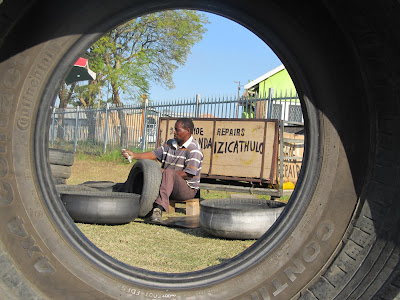• Small-scale tyres recyclers can contact the Redisa office at 021 671 7207 during office hours, where vernacular speakers will assist them with queries. They will ensure that all details and requirements are recorded correctly to enable small-scale recyclers to receive free tyres.
 |
| Mandla Shongwane |
MANDLA Shongwane (41) has been recycling tyres since 2001.
Using only a Stanley knife and a screwdriver, he cuts and shapes
old tyres into bowls, fire beaters and children’s swings.
Farmers from as far as Ladysmith stop to buy his products straight
from the road-side stall in Mkondeni.
He told Witness Wheels that he often struggles to
get enough old tyres to work on to earn his living.
When this green entrepreneur and lay preacher heard that the
Recycling and Economic Development Initiative of South Africa (Redisa) will give
him an endless supply of tyres free of charge, he was delighted.
But his joy quickly turned to dismay when he learnt from Redisa’s
website that recyclers need to make a proposal on how they will recycle
tyres.
“Redisa is being approached on an almost daily basis with proposals
for recycling plants,” the website reads.
“It is important to appreciate that while Redisa needs recyclers,
recyclers need Redisa, for no plant is financially viable without a guaranteed
long-term supply of tyres.
“However, Redisa has limited resources and cannot spend time on
proposals that do not meet minimum criteria.
“For your sake as well as Redisa’s, please ensure that any proposal
meets the following checklist before bringing it to Redisa.
• Fifty-one percent
black ownership.
• A top-level business
plan showing set-up and operating costs, revenue streams and customers
identified for the output products.
• Test certifications
attesting to the quality of the output products.
• Vendor warranties and
how they will be enforced in the event of failure to meet quality
standards.
• A full accounting of
the by-products and pollutants, and how they will be managed.
 |
| The toolbox of Mr Shongwane is not geared for the internet age, but has proven very sustainable during electricity blackouts. |
To all this, all Shongwane could reply in Zulu was: “I don’t even
have Internet.” In this, he is still one of the vast majority. A study by World
Wide Worx forecast that South Africa would have 10 million Internet users in
2013, which means 41,8 million people living in South Africa do not have access
to the Internet.
Witness Wheels then asked Redisa what programes it
has in place to ensure the initiative does not, at best, hinder, or, at worst,
stop, the supply of tyres to small-scale recyclers.
The speed with which the initiative replied was heartening and the
news for the small person on the street is good.
Clare O’Donovan, at Redisa’s media agency, responded on behalf of
her client with the good news that Redisa is working on two levels to ensure old
tyres are provided to both large and small recyclers.
“To provide some context, Redisa is operating on two levels.
Firstly, we have formed a team whose specific remit is to identify and support
small businesses, like Mr Shongwane, and such individuals are not required to
fill in the five boxes you mention in your mail. This is only required by the
large-scale recycling operations, with contracts valued at over R50 000.
“Secondly, when it comes to the large-scale processors, for whom
the recent Request for Proposals was generated, Redisa has to ensure that the
proposed plants that are selected are sustainable and represent the best outcome
for the country. There are expressions of interest received over the past year
or so that between them would require far more waste tyres than are available.
The interest arises because with Redisa in place, recycling of waste tyres
becomes an attractive proposition, but paradoxically, perhaps that puts an onus
on Redisa to pick the best of breed.
“But, as stated earlier, we will always be able to support and
encourage operations like Mr Shongwane’s, which require very small quantities of
tyres.”
